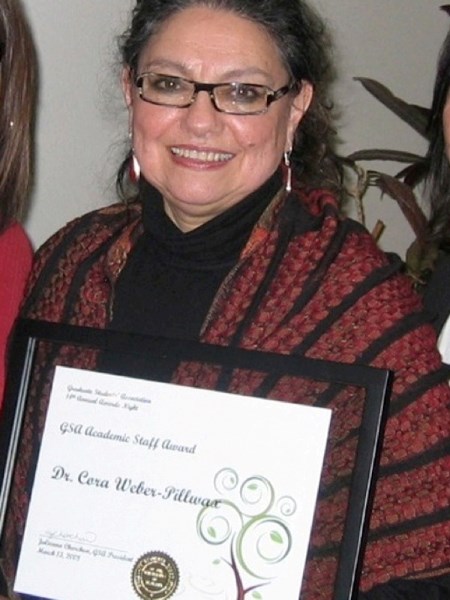Originally from Calling Lake, Cora Weber-Pillwax has been involved in Aboriginal education for over 40 years.
Last Thursday, the University of Alberta recognized her for the life-long contributions she has made to communities across Alberta. She was one of 38 people to receive an Alumni Recognition Award, given out by the school’s alumni association.
The Cree woman has been a part of the education system since 1968.
For years she served as a classroom teacher and administrator at predominantly Aboriginal schools in Grande Prairie, Lac La Biche and in the Northland School Division.
In 1992 she completed her Masters of Education, then went on to finish her PhD, eventually becoming an education policy professor at the university.
She is well known for her diligent work within Aboriginal communities, particularly as the principal investigator for the recently completed Community University Research Alliance (CURA) entitled Healing Through Language and Culture.
The project saw academics from four universities working with Aboriginal communities to “gain deeper understanding of Aboriginal people, cultures, languages and the Oblates missionaries in various communities.”
That project, with deep involvement of community members themselves, seems to typify Weber-Pillwax’s dedication to the people.
“I’m still astounded at how determined she is to engage communities respectfully in activities that will help them in their well being,” said Dr. Phylliss Steeves, who completed her PhD under Weber-Pillwax. “She puts the community first and foremost in all of her undertakings.”
She added that it was Weber-Pillwax’s subtle guidance towards independent thought and recognition of Indigenous research methodologies that stood out during her schooling.
Weber-Pillwax downplayed her own success in getting the award, again demonstrating her dedication to the people.
“None of this has ever been on my own,” she said. “I’ve never seen myself as being somehow separate and above the people I’m working with. They are the judges of success of my work.”
She touched on the difficulty of incorporating Aboriginal ways of thinking into academia today.
Where a traditional academic would focus on publishing work in journals, her culture is primarily that of oral tradition.
She said that although her own academic career has required publishing articles and the like, her priority has always been “Indigenous knowledge mobilization,” connecting teachers and elders with a “generation of people who’ve lost contact with traditional knowledge.”
“My work is so community embedded, if you really want to know about my successes, you’d have to ask the people,” she added.
Weber-Pillwax’s long career of engaging and improving the well being of Aboriginal communities is not over either.
She maintains her position as a professor in the education department at U of A, and was one of the first Aboriginals to gain tenure. She also serves as a mentor to Aboriginal students working towards graduate degrees.
She still sees community work as an integral part to her career, maintaining ties with educators in Calling Lake and across the province.
She is currently working as a principal investigator for Alberta’s portion of the national Network Environments for Aboriginal Health Research initiative.
As one of nine such centres, the program seeks to improve the health of First Nations, Inuit and Métis peoples' health across the country, with a focus on sharing knowledge and building capacity within those communities.



